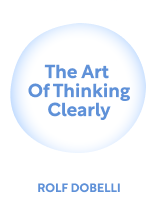

This article is an excerpt from the Shortform book guide to "The Art of Thinking Clearly" by Rolf Dobelli. Shortform has the world's best summaries and analyses of books you should be reading.
Like this article? Sign up for a free trial here .
Why do people make bad decisions? How do you make a decision when there are just too many variables to consider?
Many times, you make bad decisions because you don’t have enough options, information, or experience to make logical ones. However, too many options, information, or experience can also inspire irrational decisions.
Let’s take a look at the three situations where excess causes irrationality: 1) too much experience, 2) too many options, and 3) too much information.
Too Much Experience
When you have a lot of experience in a particular field, you form a rubric based on your experience that you follow when identifying and fixing problems. This is an asset when dealing with problems in your field of expertise. However, you apply this rubric when dealing with problems outside your field of expertise, too. This leads you to make irrational decisions or use your knowledge in harmful ways.
For example, soldiers are experts in emotional regulation and efficiency. These rubrics of problem solving are essential to how soldiers think during conflict because they allow the soldiers to act quickly in high-stress situations. However, when they return home, the same rubrics that helped soldiers in the military can damage their relationships. Trying to deal with a crying toddler through emotional regulation and efficiency won’t end well.
To overcome this issue, Dobelli recommends expanding your knowledge to give yourself as many rubrics of behavior as possible. This means you’ll know the best ways to behave in a variety of fields and situations, not just the one you’re an expert in. It’s especially important to compensate for any areas your existing rubrics and expertise leave undeveloped. The soldier, for example, might learn more about the benefits of emotions or how to accept people being less efficient.
Too Many Options
Most people think that having more options to choose from is better than having fewer, Dobelli says. However, having too many options can be just as bad as not having enough for three reasons:
1. Having too many options paralyzes you. A wide range of options makes you so afraid of choosing the wrong one that you avoid any decision, Dobelli says. (Shortform note: Some people tie this paralysis to loss aversion. The more options available, the more options you lose by choosing. You fear losing the other options more than you want to gain a single option by choosing, so you don’t choose.)
2. Having too many options lowers your standards. Lower standards make your decision easier by lessening the analysis needed for each choice, Dobelli adds. For example, if you’re overwhelmed by options for a new dishwasher, you won’t look for an affordable, quiet model that’s the right size with a good warranty. Instead, you’ll pick whichever one is the right size, regardless of other features.
(Shortform note: You make your choice easier by lowering your standards because you’re suffering from decision fatigue. Analyzing your options drains your willpower, leaving you without any willpower to make the final decision. Therefore, to make a decision, you dismiss your standards, focusing your remaining willpower on a single feature.)
3. Having too many options inspires uncertainty. After making your decision, you’ll be unhappy because you’ll never be sure it was the right choice, Dobelli says. With so many other options available, how do you know a different dishwasher wasn’t the better choice after all?
(Shortform note: This uncertainty stems from buyer’s remorse. You narrow your choice criteria, as discussed above, but you don’t forget about all the other options and features you’re sacrificing. You ignore those options to make your choice easier, but once you’ve made your decision, the knowledge of what you ignored returns, inspiring remorse and uncertainty.)
How can you avoid being overwhelmed by too many options? Dobelli suggests writing down the qualities that are important to you before evaluating your options. This stops you from becoming overwhelmed because it lets you immediately dismiss options that don’t fit your criteria.
(Shortform note: When writing down the qualities you want, be realistic about what you can actually gain. For example, if you can’t afford the dishwasher that meets all your criteria, then you can’t gain that dishwasher and need to broaden your scope. This mindset also applies when you’re making life-changing decisions. While “You can do anything” is a nice sentiment, it’s not actually true: What you can do is based on your past experience and skills. Thus, objectively evaluate your experience, skills, and options to focus on the options you can actually achieve. Doing so will ease decision anxiety and make you happier.)
Too Much Information
People also consider having more information to be better than having less. However, too much information causes problems, too. Dobelli says an excess of information causes problems in two ways: burying basic facts and wasting time. When you have too much information, a lot of it’s irrelevant to your situation. This irrelevant information makes it harder to access the useful, basic facts about your situation. In addition, you have to waste time unearthing those basic facts.
For example, consider an expert teaching a freshman physics class. The expert has so much information on atomic physics that he struggles to simplify his course and focus on the information the freshmen need to know: The basic facts are buried by the teacher’s knowledge. In addition, the teacher wastes time discussing information beyond the freshmen’s level. The students have too much complex information and not enough time to understand the simpler information they actually need.

———End of Preview———
Like what you just read? Read the rest of the world's best book summary and analysis of Rolf Dobelli's "The Art of Thinking Clearly" at Shortform .
Here's what you'll find in our full The Art of Thinking Clearly summary :
- A detailed look at the most common logical fallacies that inhibit decision-making
- How to recognize and overcome these fallacies to make better decisions
- Why you value things for arbitrary reasons






